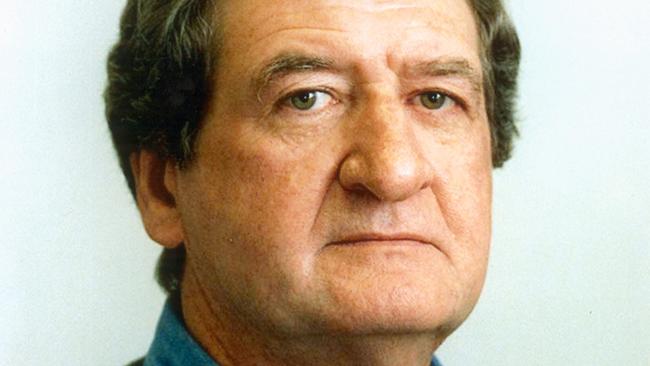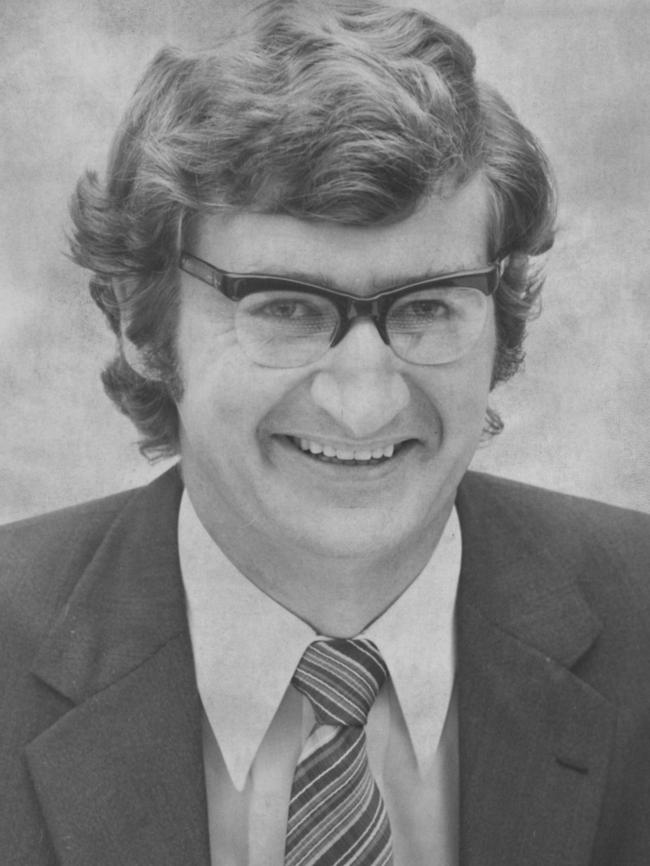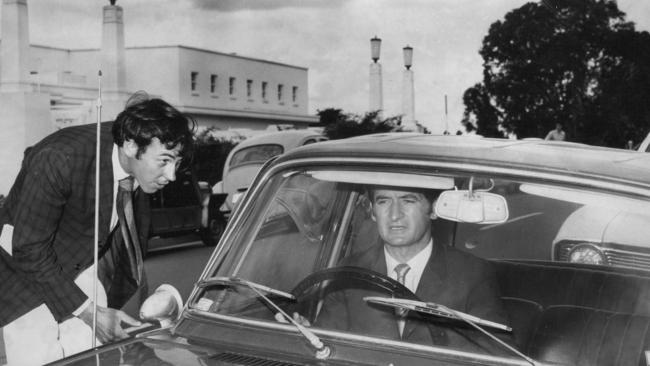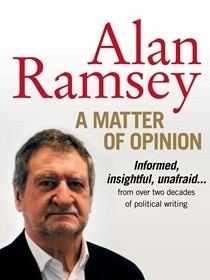Fearless, courageous, uncompromising: journalist Alan Ramsey dies, aged 82
‘I am a reporter with a point of view, that’s what I am’: respected political journalist Alan Ramsey dies, aged 82

ALAN RAMSEY
Born: Hornsby, Sydney, January 3, 1938
Died: NSW, South Coast, November 24, 2020
As a 12-year-old boy in the early 1950s, Alan Ramsey was fascinated by Nightbeat, an American radio drama featuring the fictional reporter Randy Stone — a tough journalist with a good heart, who plied his trade on the streets of after-dark Chicago.
The series lit a fire within Ramsey that never dimmed.
Inspired by the courageous reporting of Stone, Ramsey — who had not yet started high school — persuaded his mother to take him to the Telegraph office in Sydney where they met a news executive.
“I wanted to know what I had to do to become a journalist,” Ramsey said. “The message was: come back when you’re 15 years old after you’ve done your intermediate certificate.”
Three years later a telegram arrived from the Telegraph – there was a position available. Ramsey began as a copy boy. One of the first people he met was a young Peter Bowers, later an illustrious SMH journalist. “You’ve got a shit job,” Bowers told him. “Prove you can stick at it and you’ll make it.”
Ramsey, who died on Tuesday at the age of 82, stuck at journalism for more than half a century.
The job was Ramsey’s life and he honoured it with fearless passion and uncompromising commitment.

In 2017, Ramsey’s indelible mark on journalism was recognised when he was admitted to the Australian media’s hall of fame.
To mark that occasion, The Australian newspaper’s editor-at-large Paul Kelly penned a tribute to his one-time colleague.
‘He brought politicians to vivid, pulsating life’
“Ramsey didn’t much care whether people loved him or hated him — each category was oversubscribed — but Ramsey’s journalism meant nobody could survive to lunchtime without having read his column. For 50 years he stalked the halls of power driven by a compulsion to expose self-interest in the public interest,” Kelly wrote.
“He saw politics as a struggle of personalities engaged in endless combat. He brought politicians to vivid, pulsating life, since his focus was political character and the intoxicating spell of power.
“He wrote with insight and anger about human frailty and the egregious, hypocritical, funny and uplifting sides of political life. His imprint is all over political coverage of his times.”
Aged 16, Ramsey scored a cadetship on the Mount Isa Mail where he was virtually the only reporter covering courts, local events and the miners.

A brief stint in Darwin on the Northern Territory News followed, but by 1956 he had broken into metropolitan newspapers with a job on the Sydney Sun as a ‘D’ grade journalist. This included the midnight to 8am round, in the car with a driver and photographer, tuned into the police radio. The night beat dream had come true.
‘It was magic’
Subsequently, Ramsey shifted to AAP and was posted to Port Moresby for 18 months before getting the prized London appointment from 1960-64. “Everything seemed to happen while I was in London, it was magic,” Ramsey said.
After London, Ramsey was one of five reporters and photographers who travelled on the HMAS Sydney to South Vietnam with 1RAR on the initial deployment of Australian troops.
After a ‘search and destroy’ mission where a female Vietcong “suspect” had been shot, Ramsey, who was staying on the Australian military base, interviewed two soldiers and quoted one describing the action.
Army Minister Jim Forbes said Ramsey had “committed a breach of security, and despite being supported by the AAP board, he was recalled home after a few months.
The turning point in Ramsey’s career came in late 1965 when Peter Smark asked him to join The Australian newspaper, recently launched by Rupert Murdoch.
Ramsey thrived in a remarkable working partnership with Adrian Deamer, the newspaper’s editor. Ramsey worked as the paper’s chief political correspondent in Canberra, before he returned to The Australian’s Sydney office from 1969 to 1971 to be deputy editor to Deamer. The pair remained close — lifelong friends until Deamer’s death in 2000.
Fraser resignation
In March 1971 Ramsey, who had by then shifted back to Canberra to work in the gallery, published a sensational story, the biggest of his career. He reported that the head of Army, Sir Thomas Daly, in a conversation with Prime Minister, John Gorton, had accused Defence Minister, Malcolm Fraser, of extreme disloyalty to the Army and its minister, Andrew Peacock. Ramsey had put the story to Gorton before publication and it had not been denied.
The upshot within days was a crisis between Gorton and Fraser — Fraser’s resigned and Gorton eventually fell as PM. During the showdown on the floor of parliament an angry Ramsey interjected on Gorton, shouting “you liar” before a startled House, an insight into his fiery temperament.


As a historical footnote, years later Ramsey travelled to Melbourne, lunched with Fraser and told him the source of the shattering 1971 story – it had been Susan Peacock to whom Daly had confided.
In late 1973 Ramsey was forced out of The Australian as it changed its political orientation — he was told to transfer to the Sunday Telegraph and refused. “I told them I worked for The Australian. I wasn’t switching. Can you believe they sacked me for refusal of duty?”
Politics in his blood
He was furious but politics was in his blood. He remained in a press gallery freelancing until Bill Hayden became Labor leader and offered him a job. Ramsey said of those years: “You learn about politics from the inside, about the bastardry and how self-interest is so dominant. Why should anyone be surprised?”
Ramsey’s next move provided him with the most high-profile role of his career — Saturday political columnist with the Sydney Morning Herald, a position he held for 21 years, spanning four prime ministers and eight federal elections.
As Kelly observed: “His weekly judgments were harsh and acerbic, critical of Hawke, supportive of Keating, hostile to Howard. Yet Alan’s anger was punctuated by tragic comedy – he saw the funny side of human nature and his deep laugh would ring down the corridors as he told yet another anecdote of human folly.”
In an interview with the ABC in 2005, a few years before his retirement, Ramsey offered an insight into how he viewed his role in the political process.
‘Not part of the cheer squad’
“I see the press’s role particularly in politics as being not part of the cheer squad. You’ve got to question everything, you’ve got to be sceptical about it, everything that’s done and everything that’s said. That treads on a lot of toes over time and politicians don’t like it, they like ciphers,” he said.

“You’re always sucking up to them, just as they are sucking up to you. You’ve just got to be careful and you’ve got to know when they’re doing it, and you’ve got to make sure you don’t sell yourself short.”
Asked how he would sum up his contribution to public debate, Ramsey said: “I am a reporter with a point of view, that’s what I am.”
Kelly, who worked alongside Ramsey in the Canberra press gallery for The Australian in the early 1970s, remembered him thus: “Alan was unique, often too honest and fierce for his own good. His insights were sharp and his columns became a long study in the interaction of politics and human nature.
“He generated fear and respect among politicians and was recognised for his unrivalled possession of that indispensable journalistic virtue — courage.”
Former Labor senator John Faulkner said: “Ramsey never lost his passionate commitment to what he believed was best in Australia. He never held back from arguing for it, nor did he ever refrain from railing against those he believed were letting the country down.”
Ramsey had three children with his first wife Jeanette; with his second wife, journalist Laura Tingle, he had a daughter.
Ramsey died on Tuesday, aged 82. He had suffered from dementia in recent years.




To join the conversation, please log in. Don't have an account? Register
Join the conversation, you are commenting as Logout